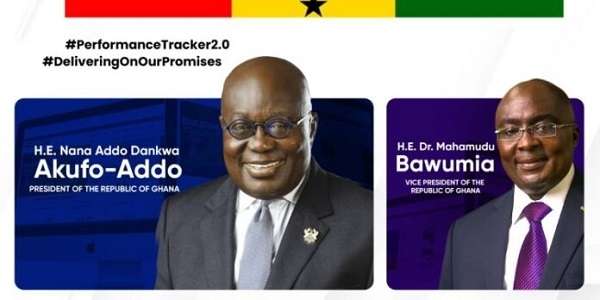In recent years, governments around the world have embraced the use of performance trackers as a means to evaluate their performance and enhance transparency. Ghana is no exception, as it has implemented its performance tracker to monitor the government’s progress in various sectors.
The Government of Ghana’s Performance Tracker has been a topic of intense debate, with opinions varying widely on whether it serves as a tool for governance or a political instrument. The Performance Tracker was launched to enhance transparency and accountability in the execution of infrastructure projects nationwide. It is designed to provide a reliable mechanism for showcasing the progress and impact of these projects, thereby instilling trust and confidence among citizens.
“A key component of good governance is accountability and transparency. I think that once we are moving towards the digital age, it’s something that we are pushing and preaching. Let the people know what is happening, let them critic and query it. There is nothing wrong if you put yourself out there for the people and they even identify gaps and they raise concerns about those gaps. So, this tracker is one of the government’s ways of accounting to the people.”
Dennis Miracle Aboagye, A Presidential Staffer
The implementation of a performance tracker can contribute to efficient governance by providing an objective assessment of the government’s performance. It enables citizens to monitor the government’s progress in meeting its promises and holding it accountable for its actions. This transparency fosters a sense of trust and legitimacy among the public, as they can actively engage in the decision-making process.
Moreso, a performance tracker allows the government to evaluate the effectiveness of its policies and programs. It provides valuable insights into what is working and what needs improvement, facilitating evidence-based decision-making and ensuring that resources are allocated efficiently. This data-driven approach can lead to more effective governance and better outcomes for citizens.
Supporters of the Performance Tracker, including Kojo Oppong Nkrumah, the former Minister of Information, have defended it as a genuine effort to promote transparency and accountability. Nkrumah highlighted the tracker’s potential to address misinformation and provide citizens with factual data about government projects, emphasizing the importance of being informed and verifying facts before engaging in discussions.
By tracking and measuring performance indicators, the government can identify areas of weakness and take corrective actions. It promotes a culture of continuous improvement and allows for greater efficiency and effectiveness in the delivery of public services. The performance tracker can serve as a valuable tool for governments to learn, adapt, and evolve their policies and programs.
Performance Tracker as a Political Tool

Critics, however, have raised concerns about the tracker’s effectiveness and its potential use as a political tool. For instance, Stan Dogbe, a political analyst, has argued that the Performance Tracker could be used to deceive Ghanaians, suggesting that it might not be as transparent or accountable as it claims to be. This viewpoint is echoed by others who have called for an independent probe into the government’s Performance Tracker, questioning its accuracy and the source of the data presented.
Critics argue that the performance tracker can be manipulated by the government to create a positive perception of its performance, especially during election periods. The government may focus on highlighting achievements and downplaying failures to influence public opinion. This selective presentation of data can undermine the credibility of the tracker and raise doubts about its objectivity.
“The reality is that for any such document, the starting point is its accuracy. It must be an accurate document of what is happening or what has happened. The inconsistencies demonstrate clearly that this has been – a shoddy piece of work. There are too many discrepancies and perhaps the fact that they have to use an IT system has made them very lazy in the way the information was put out.”
Alex Segbefia, former Health Minister
Additionally, the absence of an independent body to assess the performance tracker’s data and methodology can raise concerns about its reliability and accuracy. Without proper checks and balances, there is a risk that the government may present biased information to suit its political agenda. This undermines the integrity of the performance tracker and reduces its effectiveness as a governance tool.
Some argue that performance trackers often focus on specific sectors or indicators, neglecting broader socioeconomic issues that are equally important for good governance. By narrowing the focus, the government may prioritize certain areas while ignoring others that require urgent attention. This selective approach can hinder holistic development and perpetuate inequalities within society.
The former Health Minister, Alex Segbefia, questioned, “Even on infrastructure, the biggest omission is the National Cathedral. Where is it? Government money has been invested into the national cathedral, so why is it not on the performance tracker?”
The Government of Ghana’s performance tracker has the potential to be both a tool for good governance and a political instrument. While it can enhance transparency, accountability, policy effectiveness, and continuous improvement, it also faces challenges such as potential manipulation, lack of independent evaluation, and neglect of broader socioeconomic issues.
To ensure the performance tracker serves its intended purpose, the government must address these concerns, establish independent oversight, and ensure the inclusion of a wide range of indicators that truly reflect the needs and aspirations of the Ghanaian population. Only then can the performance tracker truly contribute to effective governance and sustainable development in Ghana.
READ ALSO: NPP Communicator Touts Government’s Achievement In Education


















